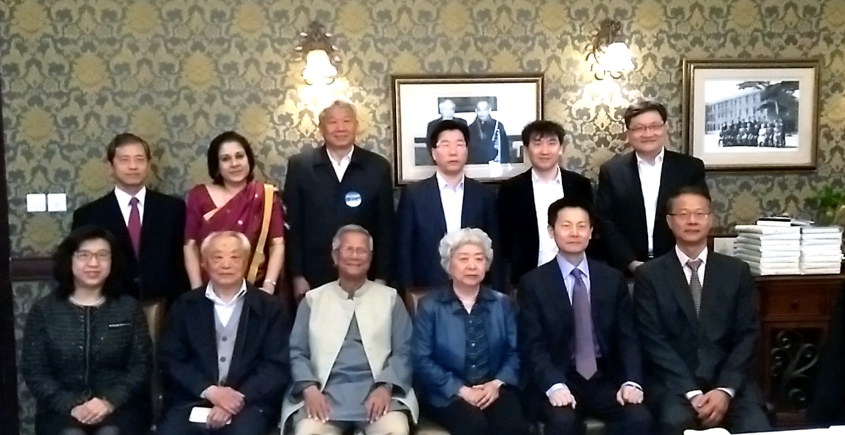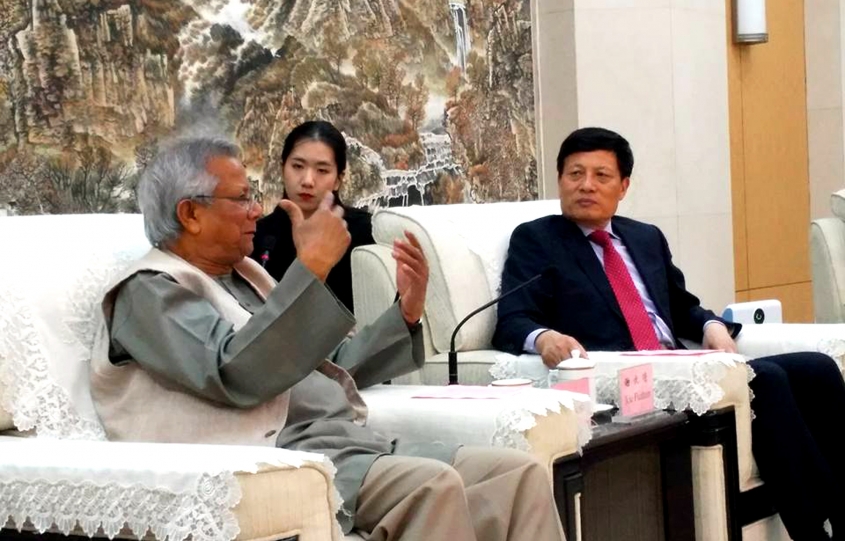Yunus Centre Press Release (21 September, 2016)
President Hollande of France and President Zuma of South Africa, Co-Chairs of High Level WHO Commission on Health Employment and Economic Growth presented its final report to the UN Secretary General Ban Ki Moon at the UN Head Quarters on September 20. Nobel Laureate Professor Muhammad Yunus is a member of this High Level WHO Commission appointed by the UN Secretary General.
On March 2 of this year, United Nations Secretary-General Ban Ki-moon announced the appointment of a Commission on Health Employment and Economic Growth tasked with proposing actions to redress inequities, and stimulate and guide the creation of health and social sector jobs for inclusive economic growth.
Nobel Laureate Professor Muhammad Yunus is one of the commissioners invited by the Director General of WHO Dr Margaret Chan to join the Commission to provide a balance of policy, technical and geographical expertise for the report. Other commissioners include Nobel Laureate in Economics Professor Joseph Stiglitz, Dr Judith Shamian, Dr Nkosazana Dlamini-Zuma, Chairperson, African Union Commission, Dr Margaret Chan, Director General of WHO, Ángel Gurría, Secretary General of the OECD and Guy Ryder, Director General of the International Labour Organisation (ILO).
The report was formally handed over to the Secretary General in a formal ceremony in the presence of all members of the Commission at a special meeting convened at UN Headquarters on September 20 on the sidelines of the UN General Assembly.
On the previous day, the Commissioners met at a special meeting at UN Headquarters to endorse the report in a session moderated by Dr Richard Horton, Editor of Lancet.
The report, which aims to convince Heads of State of the pressing need for strong mobilization in favor of enhancing the health workforce as well as health employment in order to contribute to the 2030 SDG Agenda, made ten recommendations made in the report relate to job creation, gender and women's rights, education training and skills, health service delivery and organization, harnessing of cost effective ICT, crises and humanitarian settings, financing and fiscal space, partnership and cooperation, international migration, data, information and accountability.
Nobel Laureate Professor Yunus was invited by the Director General of WHO to contribute a special box in the report on the role that social business can play in reaching healthcare to the poorest around the world who are not reached by conventional health care programs. This is now presented in final report as a box. Professor Yunus argued that the solution to healthcare is in making it sustainable, and affordable, to the extent of making it almost costless by introducing power of technology to enable it to reach every single person on the planet, focusing on prevention, promotion of social business entrepreneurship and elimination of all unhealthy foods and drinks.
The report recommends the UN Secretary General to help establishing appropriate global framework and makes sure recommendations in the report are included in action plans by national governments and to develop a five-year implementation plans for the recommendations.
--- End ---
The special box contributed by Professor Yunus which forms part of the final report.
Box 7.
Social business models for health service delivery
For the most part, health service delivery in any country has been the work of three players with varying degrees of participation: government, profit-seeking private sector and charities. Despite the efforts of these three, billions of people remain unreached. Thus, I have been promoting a fourth approach – social business – because I believe that the application of the concept of social business can lead to the redesigning of the entire health-care sector.
Existing limitations
Few would argue against the position that the current way of doing the business of delivering health care has serious limitations. In many countries, government health-care programmes run into bureaucracies rife with inefficiency, lack of innovation and initiative, corruption and wastage. Because of these problems, the people at the bottom of society suffer the most. The profit-seeking private sector is concerned with the upper segment of the market where they make their profit; they do not focus on the bottom half of the population, on those who are in greatest need of their services. And although charity programmes do reach the poor and the poorest, they are unsustainable. As a result, they can provide service only to a limited number of people and only for a limited time.
What is social business?
The concept of social business stands between the profit-seeking private sector and charity. It has the same goal as charity but is powered by the engine of business. It is sustainable while at the same time it reaches out to the poorest. It is driven by technology to make health service universal, cheaper and affordable. It can be run by anyone – industry, business, government, individuals, foundations, nongovernmental organizations.
We have created many practical examples of social business by applying this concept in Bangladesh and other countries. Believing that health care should be technology based and oriented primarily towards prevention, we have set up a chain of eye-care hospitals, clinics, nursing colleges and joint ventures with multinational companies who deliver the basic essentials for health such as nutrition, water, mosquito-nets and food.
The Grameen clinics’ experience proves that a medical system “for the poor” can be almost entirely self-supporting, and can reach self-sufficiency. For example, the Grameen GC Eye Care Hospital in Bangladesh, and the Aravind hospital in India can do cataract surgery for US$ 25. We are in the process of setting up hospitals and medical colleges. We are encouraging technology companies to provide all diagnostic services through smart phones to make them almost costless. We emphasize prevention, to keep people healthy and avoid costly cure procedures. We insist that the goal of health care should be to keep people away from diseases, rather than wait for the point when they have to show up at doctor chambers or hospitals for treatment.
We see health care as an excellent area for entrepreneurship, bringing out the creative power of citizens expressing themselves to solve health problems through social business. We encourage young people to become entrepreneurs, job-creators rather than job-seekers, tackling the health concerns of those who are left out.
Contributed by Professor Muhammad Yunus, Commissioner and Nobel Peace Prize Laureate
REPORT OF THE COMMISSION
--------------




 SOCIAL BUSINESS
SOCIAL BUSINESS 

 Events
Events News
News







